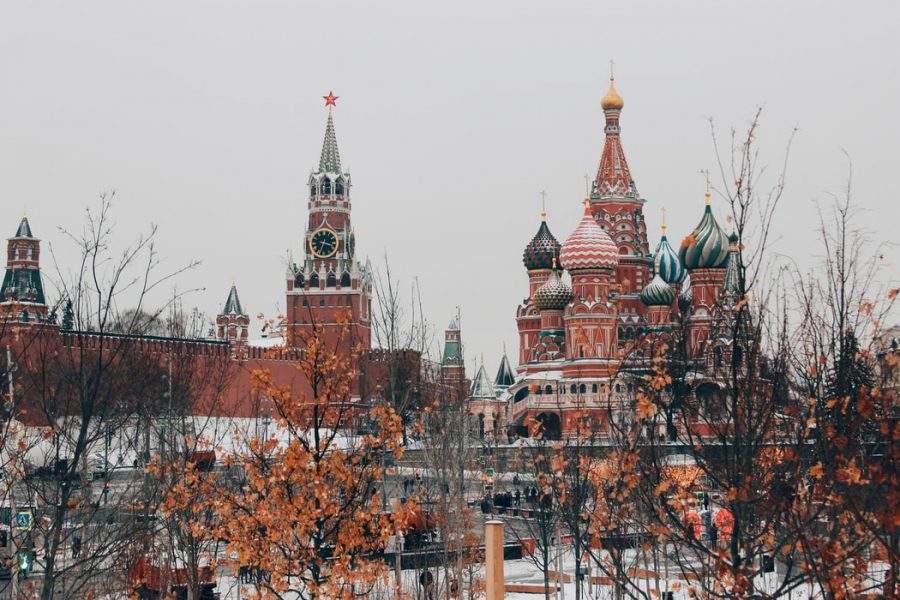President Biden, Navalny’s Imprisonment, and the Dilemma With Russia
Several months after Alexei Navalny’s first imprisonment, his conditions and those of Russian democracy seem to be continuing to steadily worsen.
The Kremlin is the building that has become associated with Putin’s government.
For over half a century, Russia has dominated our front-page news. The communist threat and the goings-about of one general secretary or another were on the tips of everyone’s tongues. Despite all this attention, it seems that the majority of the American public remains unaware of the situation in Russia. As Benjamin Raab `22 said, “I don’t really know much about Russia except that Putin is essentially its dictator.”
Although the Iron Curtain is long fallen, recent events have demonstrated the preeminence of Russia in the States’ geopolitical considerations. While still somewhat controversial, definitive evidence was laid out by the Mueller Report to prove that there was Russian interference in the 2016 election. Furthermore, ever since the Russian annexation of the Crimean Peninsula in 2014, the war in Ukraine has threatened to upset the relative peace of Europe.
The latter of these issues has become especially relevant in recent weeks. Reports have come to light of the deaths of four Ukrainian soldiers at the hands of Russian-backed rebels in the eastern Donbas region. This news comes just a day after reports surfaced of the movement of Russian armored vehicles to the Ukraine-rebel border. Both of these allegations have been fervently denied by the Kremlin. However, President Vladimir Putin has rallied support in Russia several times through victories against the West. The timing of the militarization suggests an attempt by Putin to regain control over the public after having been dealt a serious blow to his legitimacy by the pandemic and Alexei Navalny.
Like many opposition leaders working in countries with state-run media, Alexei Navalny gained notoriety for his work providing independent news via platforms such as YouTube. His work focused on exposing corruption in Putin’s regime through the production of several scathing documentaries. This criticism propelled him to a natural spot as a political opponent of Putin. After running for and failing to win several smaller positions including the mayor of Moscow, Navalny tried to garner support for presidential candidacy in 2018. He was first barred from candidacy because of previous convictions for protesting Putin’s presidency, all of which have since been denounced as politically motivated. Nevertheless, Navalny continued fighting to demonstrate Putin’s authoritarianism when he was poisoned with a nerve agent and forced to leave the country to recuperate. When he returned in January 2021, Navalny was arrested on the spot.
The arrest garnered immediate international condemnation. Russia was quickly sanctioned by various EU leaders who had already been outspoken in their criticism of Putin for Navalny’s poisoning. Following Joe Biden’s inauguration, an FBI investigation was launched, which confirmed that the Russian government had been involved in poisoning Navalny. After the results of the investigation were published in mid-February 2021, Biden also announced sanctions on Russia.
However, several figures have criticized Biden for not doing enough to help Navalny. Putin’s response to recent protests has been heavy-handed. Navalny was moved from a regular prison to what has been described as a “concentration camp.” In letters published by his team, he described being tortured by sleep deprivation and refused basic medical care. Meanwhile, the tens of thousands of Russians who first came out to protest after Navalny’s imprisonment have dwindled away. Following the government’s indiscriminate arresting of protestors, Navalny urged his supporters and all those dissatisfied with Putin to stop protesting and regroup in the coming State Duma elections.
These events are disturbingly similar to those that occurred in nearby Belarus. In both cases, an authoritarian leader who had benefited from a state-run media and industry turned to brutal suppression when his popularity began to falter. In Belarus’ case, it has been more than 6 months since the start of the protests and both President Lukashenko and his authoritarian regime remain in power.
Putin is a pragmatist and will not start a war over Ukraine or Navalny. However, he also is prone to testing the determination of the West. If a firm position is not taken on Navalny’s imprisonment, it is reasonable to expect that Putin will sense weakness and strike in Ukraine.
If a firm position is not taken on Navalny’s imprisonment, it is reasonable to expect that Putin will sense weakness and strike in Ukraine.
Anton Karp is a News Editor for 'The Science Survey.' He is most interested in the research that goes into the journalistic writing process. Anton values...











